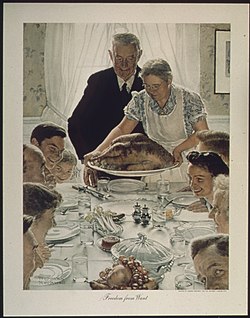What Matters/Family
Family
[edit | edit source]
Life often centers on your family. If your family provides you with harmonious relationships and a safe haven from the difficulties of the world, it may be your greatest source of well-being. However, if the family is chaotic and the family relationships are discordant, the family will be a source of stress and unhappiness. Alternatively you may be, or feel, distant or isolated from your family.
Assignment 1:
[edit | edit source]Enjoy spending time together as a family. This might be enjoying meals together a few times a week, reading to young children, playing cards or solving a puzzle together, playing ball in the yard, skating, sledding, skiing, swimming, biking, or hiking together, or some other activity where you each enjoy active participation and interaction. Consider keeping a journal on what you enjoyed about your family activity and doing more of that.
Assignment 2:
[edit | edit source]- Identify all the people in your (extended) family. Consider parents, siblings, spouse, and children as appropriate. Include grandparents, aunts, uncles, cousins, lovers, the departed, and others if they are important to your family dynamics.
- Briefly describe the relationship you have with each of these family members. Is it close and harmonious, strained, distant, estranged, hostile, or any of the various types described in this list of emotional relationships? Consider drawing a genogram of the family.
- For each relationship that is important to you, work to make it more harmonious.
- Contact the person and tell them that you value the relationship and you want to work to improve it.
- Make amends: forgive, and apologize where you can do so sincerely.
- Practice tolerance and compassion.
- Value, but do not expect, constructive reciprocity.
- Disengage from any abusive relationships.
- Follow these rules during your interactions. Work to resolve your conflicts constructively.
- Consider completing the Wikiversity course on Practicing Dialogue.
- Consider completing the Wikiversity course on Transcending Conflict.
Suggestions for further reading:
[edit | edit source]- Satir, Virginia (1988). The new peoplemaking. Palo Alto, CA: Science and Behavior Books. ISBN 0-8314-0070-6.
- Berne, Eric (1996). Games People Play: The Basic Handbook of Transactional Analysis. Ballantine Books. pp. 216. ISBN 978-0345410030.
- If you are considering professional family counseling the book Family Healing[1] may give you a glimpse of how one skillful therapist works.
- (Evaluate: Rebuilding Workbook: When Your Relationship Ends by Bruce Fisher)
- (Evaluate: Getting Free: You Can End Abuse and Take Back Your Life by Ginny NiCarthy)
References:
[edit | edit source]- ↑ Minuchin, Salvador (1998). Family Healing: Strategies for Hope and Understanding. Free Press. pp. 304. ISBN 978-0684855738.
